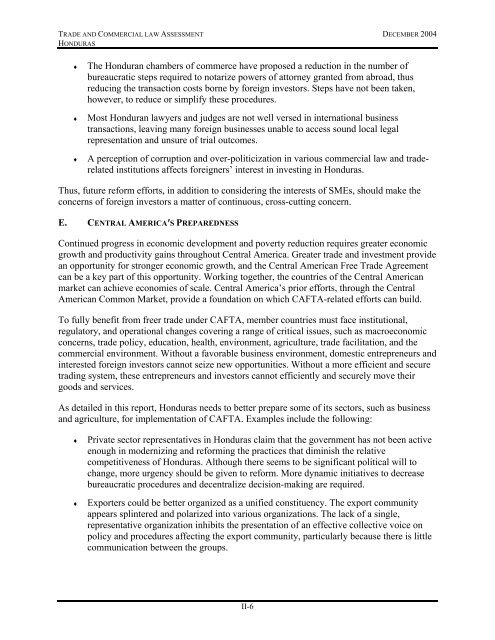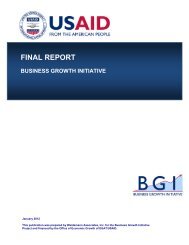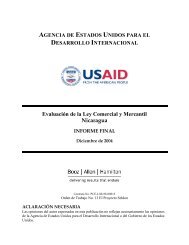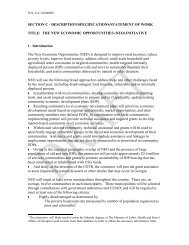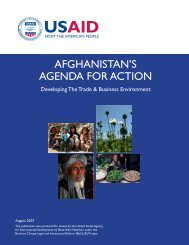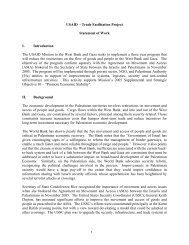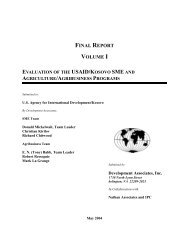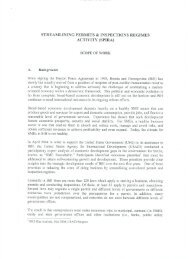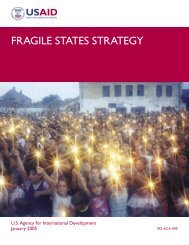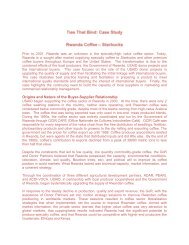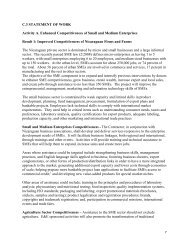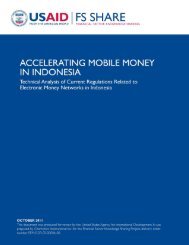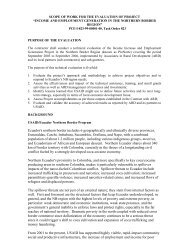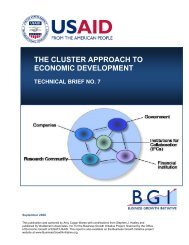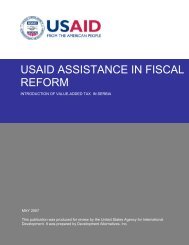Trade and Commercial Law Assessment - Honduras - Economic ...
Trade and Commercial Law Assessment - Honduras - Economic ...
Trade and Commercial Law Assessment - Honduras - Economic ...
You also want an ePaper? Increase the reach of your titles
YUMPU automatically turns print PDFs into web optimized ePapers that Google loves.
TRADE AND COMMERCIAL LAW ASSESSMENT DECEMBER 2004HONDURAS♦♦♦The Honduran chambers of commerce have proposed a reduction in the number ofbureaucratic steps required to notarize powers of attorney granted from abroad, thusreducing the transaction costs borne by foreign investors. Steps have not been taken,however, to reduce or simplify these procedures.Most Honduran lawyers <strong>and</strong> judges are not well versed in international businesstransactions, leaving many foreign businesses unable to access sound local legalrepresentation <strong>and</strong> unsure of trial outcomes.A perception of corruption <strong>and</strong> over-politicization in various commercial law <strong>and</strong> traderelatedinstitutions affects foreigners’ interest in investing in <strong>Honduras</strong>.Thus, future reform efforts, in addition to considering the interests of SMEs, should make theconcerns of foreign investors a matter of continuous, cross-cutting concern.E. CENTRAL AMERICA′S PREPAREDNESSContinued progress in economic development <strong>and</strong> poverty reduction requires greater economicgrowth <strong>and</strong> productivity gains throughout Central America. Greater trade <strong>and</strong> investment providean opportunity for stronger economic growth, <strong>and</strong> the Central American Free <strong>Trade</strong> Agreementcan be a key part of this opportunity. Working together, the countries of the Central Americanmarket can achieve economies of scale. Central America’s prior efforts, through the CentralAmerican Common Market, provide a foundation on which CAFTA-related efforts can build.To fully benefit from freer trade under CAFTA, member countries must face institutional,regulatory, <strong>and</strong> operational changes covering a range of critical issues, such as macroeconomicconcerns, trade policy, education, health, environment, agriculture, trade facilitation, <strong>and</strong> thecommercial environment. Without a favorable business environment, domestic entrepreneurs <strong>and</strong>interested foreign investors cannot seize new opportunities. Without a more efficient <strong>and</strong> securetrading system, these entrepreneurs <strong>and</strong> investors cannot efficiently <strong>and</strong> securely move theirgoods <strong>and</strong> services.As detailed in this report, <strong>Honduras</strong> needs to better prepare some of its sectors, such as business<strong>and</strong> agriculture, for implementation of CAFTA. Examples include the following:♦♦Private sector representatives in <strong>Honduras</strong> claim that the government has not been activeenough in modernizing <strong>and</strong> reforming the practices that diminish the relativecompetitiveness of <strong>Honduras</strong>. Although there seems to be significant political will tochange, more urgency should be given to reform. More dynamic initiatives to decreasebureaucratic procedures <strong>and</strong> decentralize decision-making are required.Exporters could be better organized as a unified constituency. The export communityappears splintered <strong>and</strong> polarized into various organizations. The lack of a single,representative organization inhibits the presentation of an effective collective voice onpolicy <strong>and</strong> procedures affecting the export community, particularly because there is littlecommunication between the groups.II-6


